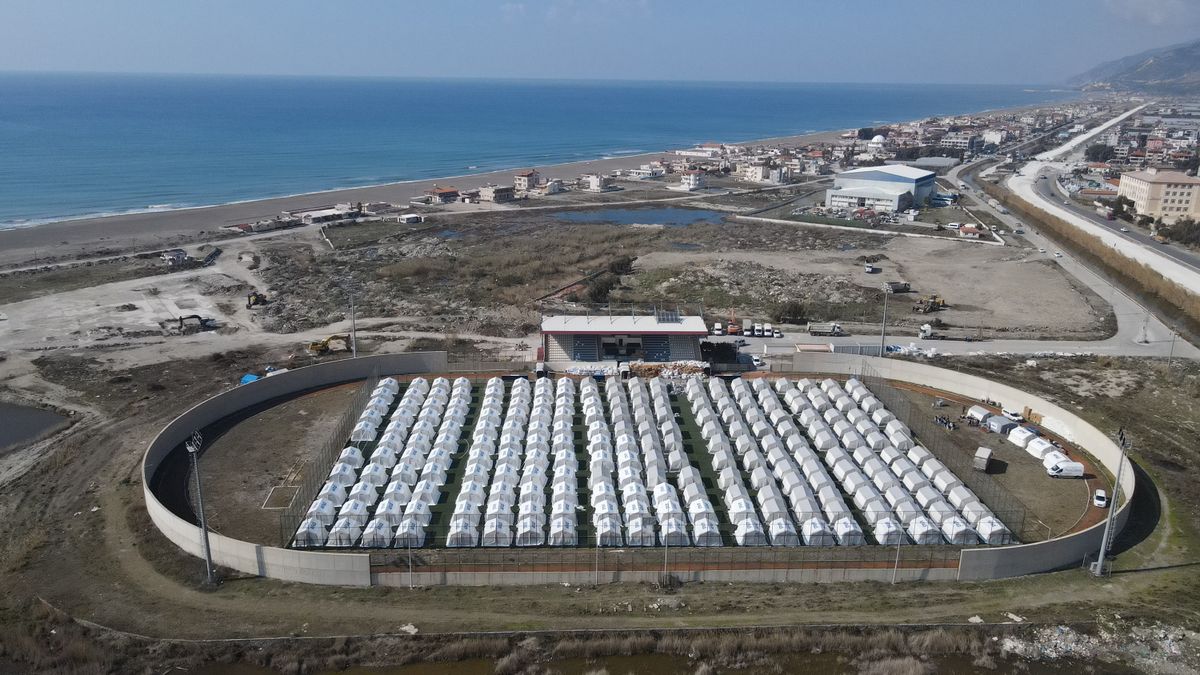1.2 million left homeless in Turkey, as last-hope rescues are reported

BEIRUT — The devastating earthquakes in the Turkish-Syrian border region one week ago have left 1.2 million people in southeastern Turkey homeless, Turkey’s presidential office said Monday, as probably the last survivors were found under rubble.
A 13-year-old boy was carried out on a stretcher alive Monday evening after spending 182 hours under rubble in the Hatay province of Turkey, state broadcaster TRT reported. Footage showed a volunteer holding his hand.
In the southeastern region of Adiyaman, a 6-year-old girl was also found earlier in the day, 178 hours after the quakes, said Turkey’s Defense Ministry. This is past the usual cut-off point for survival. The chances for further rescues are slim.
Survivors who are still being found now have had access to water, such as from rainwater or snow. Normally, a person can go about 72 hours without water, after which it becomes life-threatening.
Meanwhile, around 176,000 tents have been set up in the worst-hit provinces of Turkey. The disaster authority AFAD also said it had set up thousands of living containers.
Nearly 400,000 people have been evacuated from the earthquake zones, said the presidential office.
Inspections were being carried out by authorities to determine which buildings in the 10 affected provinces were still inhabitable. As of Monday afternoon, more than 7,500 buildings had already collapsed or had to be urgently demolished, said Banu Aslan, director of the construction department, according to the Anadolu news agency.
Thousands of buildings collapsed in Turkey after Monday’s two massive quakes.
The situation in war-ravaged Syria is even more precarious, given that many people were already displaced within the country.
The White Helmets rescue volunteer force said on Twitter: “The White Helmets declare official mourning throughout Syria, and we will fly flags at half-mast for seven days, starting today, Monday, February 13, to mourn the souls of the earthquake victims in #Syria and #Turkey, and we declare February 6 as a national day of mourning every year to commemorate the victims.”
The tweet indicates that the group has given up on finding anyone else alive.
UN aid chief Martin Griffiths arrived in Aleppo on Monday, according to Syrian state news agency SANA, amid heavy criticism of delays in earthquake aid.
Griffiths met Syrian President Bashar Assad, SANA reported, with the two discussing the repercussions of the earthquake and the urgent humanitarian needs of the Syrian people to overcome these repercussions.
Griffiths stressed that the United Nations is working to support relief efforts and meet the humanitarian needs of the Syrians, while Assad affirmed to Griffiths “the need for urgent aid to enter all areas in Syria, including areas under occupation and under the control of armed terrorist groups,” SANA reported.
SANA said the president also stressed the importance of focusing international efforts on helping to rebuild the infrastructure in Syria.
Griffiths later said that Assad had agreed to open two more border crossings into Turkey, according to diplomats. The Bab al-Salam and al-Ra’ee crossings should be opened for three months to improve humanitarian aid in hard-to-reach earthquake-hit zones of Syria.
U.N. Secretary-General António Guterres welcomed Assad’s decision.
The U.N. said on Monday morning that six trucks were now entering into northern Syria carrying mainly tents.
Compared to the international response in neighboring Turkey, many feel that the help is too little, too late for Syria.
The first U.N. relief delivery only arrived in northwestern Syria on Thursday, as trucks passed from Turkey through the only remaining open border crossing at Bab al-Hawa.
Syrians are also still dealing with the horrors of the war on top of managing the aftermath of the earthquake.
The head of the war monitor Syrian Observatory for Human Rights, Rami Abdel Rahman, told dpa that despite the human tragedy and “while Syrians are still uncovering bodies from under the rubble, a Turkish drone attacked Kurdish-led areas on Sunday,” killing a man in the western Ain al-Arab countryside.
One week after the catastrophic earthquakes, the number of dead continues to rise.
The total number of confirmed dead has topped 37,500, and more than 80,000 people have been injured.
In Turkey alone, the death toll has climbed to 31,643, according to Anadolu, citing AFAD.
In neighboring Syria, at least 5,900 people are known to have died, according to World Health Organization figures.
A baby girl born under the rubble of her family’s home in northern Syria after last week’s devastating earthquake was in good health Monday, the Associated Press reported, and being breast-fed by the wife of the director of the hospital where she is being cared for, her doctor said.
The extent of the quakes’ damage has resulted in widespread anger.
This anger is already being addressed in Turkey, where officials issued arrest warrants for alleged negligence concerning collapsed buildings following the quakes, according to Anadolu. Over 100 arrest warrants were issued Sunday for contractors across the country.
Turkish opposition leader Kemal Kılıçdaroğlu criticized the government for issuing a building amnesty in 2018 that allowed illegally constructed buildings in exchange for penalties after the fact.
“They turned the houses where people live into graveyards and took money for that,” he said.